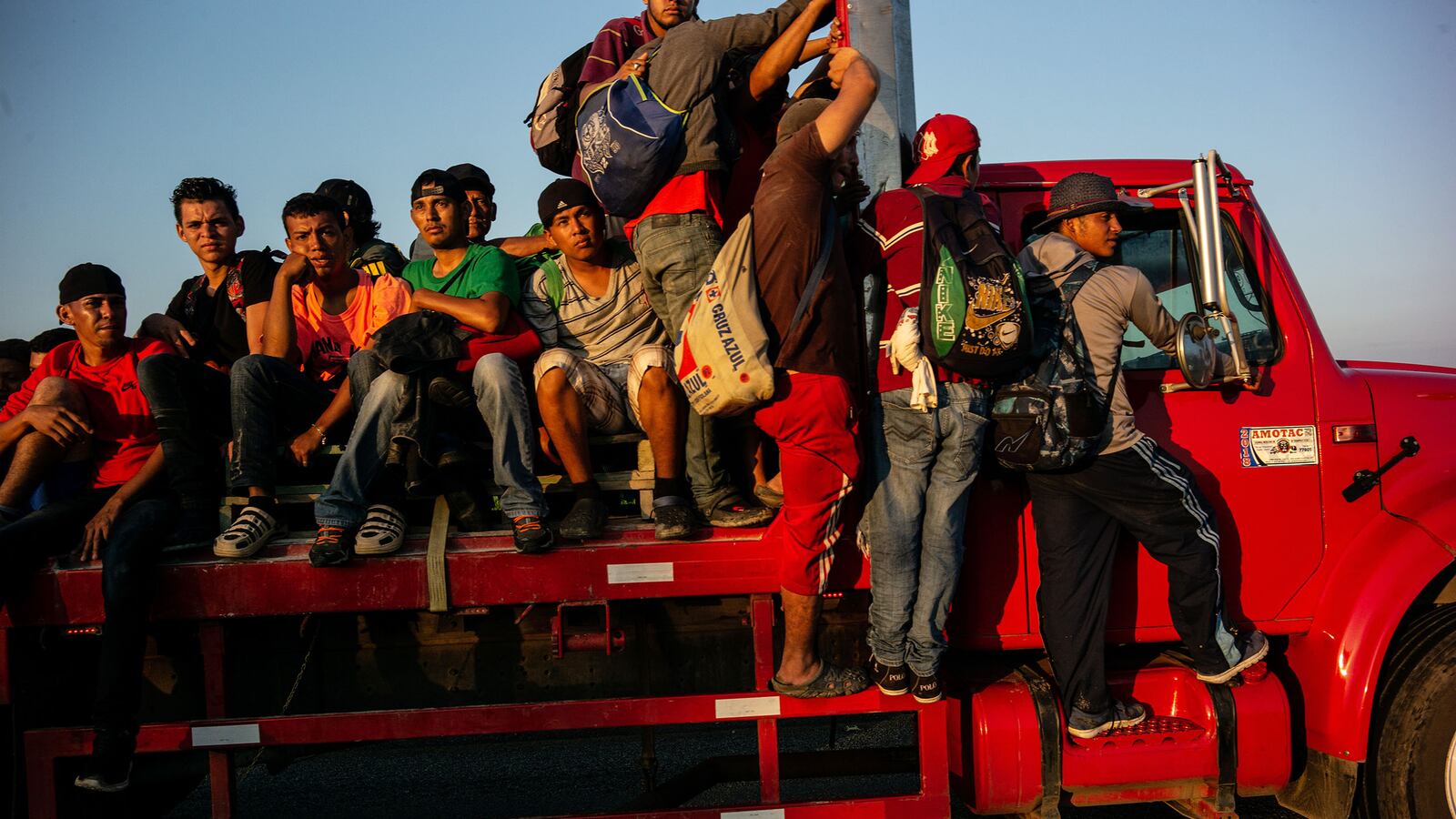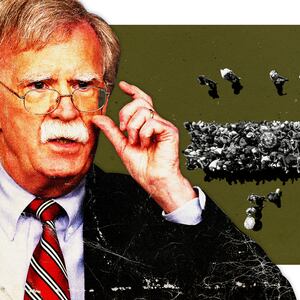As a group of an estimated 5,000 men, women and children slowly trek north from Central America in hopes of claiming asylum at the U.S. southern border, President Donald Trump is framing the group’s 1,100-mile march as a “national emergency”—and has vowed economic vengeance upon the home nations of the would-be asylum-seekers.
But President Trump’s “solution” to the caravans, experts on the region say, will only guarantee more caravans in the future.
President Trump’s infuriated threat to “begin cutting off, or substantially reducing” foreign aid to El Salvador, Guatemala and Honduras, in response to a pair of migrant caravans making their way to the United States, will likely only exacerbate the conditions in those countries that have sparked a massive surge in the number of migrants fleeing in search of a better life.
“It’s clear that cuts to these vital programs—that directly engage youth, reduce violence and poverty, and strengthen law enforcement—could cause huge setbacks,” said Liz Schrayer, president and CEO of the U.S. Global Leadership Coalition (USGLC), a coalition of more than 500 businesses and non-governmental organizations that advocates for expanding America’s role in international development. “Instead of scaling back critical aid programs, we should be scaling up an accountable partnership with El Salvador, Guatemala, and Honduras to confront the root causes driving violence and despair.”
The conditions driving the mass departure of migrants from the three countries, nicknamed the “Northern Triangle,” are certainly dire. Two in every three Hondurans live in poverty, and in impoverished rural areas, one in five live on less than $1.90 a day. The economic crisis, coupled with deteriorating government stability in all three nations, has resulted in a marked increase in gang violence. Fewer than one in ten violent crimes are ever solved in Honduras, in part because many members of the police also moonlight as enforcers for the organized crime syndicates that have made Honduras one of the most dangerous countries in the world.
Add a rash of recent droughts that threaten the food security of millions across the region, and the relationship between deteriorating economic, social and governmental conditions on the ground snaps into focus.
A report published by U.S. Immigration and Customs Enforcement (ICE) found that in 2016 and 2017, one in three undocumented migrants removed from the United States by ICE came from El Salvador, Guatemala or Honduras. According to the International Organization for Migration, asylum claims from those fleeing the region increased five-fold between 2012 and 2015, and of the 3.4 million U.S. residents born in one of the Northern Triangle countries, the Pew Research Center estimates that roughly 55 percent are undocumented.
Some members of the Trump administration, seeing the direct relationship between chaos in the region and a massive influx of undocumented people fleeing that chaos, have called for increased aid to the Northern Triangle as a way to prevent a growing migrant crisis.
“The securing of our southwest border, in my view, begins 1,500 miles south,” said White House chief of staff John Kelly in a 2017 keynote address on U.S. strategy in the region at the Atlantic Council. “If we can improve the conditions—the lot of life of Hondurans, Guatemalans, Central Americans—we can do an awful lot to protect the southwest border.”
Under President Barack Obama, the State Department had increased aid to the region in hopes of achieving Kelly’s stated goals for El Salvador, Guatemala and Honduras: increased economic growth, government stability and a tighter rein on organized crime. A similar initiative begun in 1999, Plan Colombia, is now seen as a roaring success in fighting crime, government instability, and economic distress in that country, as well as helping end a decades-old armed conflict between the Colombian government and the rebel group FARC.
Similar programs in the Northern Triangle have already begun working: according to the U.S. Global Leadership Coalition, development funds issued by the U.S. Agency for International Development have helped lift 68,000 Hondurans out of extreme poverty—which means 68,000 people who are less likely to join a caravan bound for Brownsville, Texas. Earmarked for programs meant to boost legitimate economic development, strengthen state institutions, address climate change and food insecurity, and enhance security in a region where the police and the gangs are often functionally indistinguishable, those funds play “a critical role in supporting Honduras' development as a safe, democratic, and prosperous nation that offers hope to Hondurans so they see their future in Honduras and not elsewhere,” according to the State Department.
But even before President Trump tweeted that “we will now begin cutting off, or substantially reducing, the massive foreign aid” sent to El Salvador, Guatemala or Honduras because of their inability “to do the job of stopping people from leaving their country and coming illegally to the U.S.,” plans were already underway by the Trump administration to severely curtail aid to the three countries.
According to the Department of State, aid to El Salvador has dropped from $112 million spent in 2016 to a planned $45 million in 2019; in Guatemala, aid shrank from $129 million to a proposed $69 million in 2019; in Honduras, $113 million in aid has been slashed nearly in half, to a proposed $65 million.
“American aid to the Northern Triangle is not ‘massive’ and in fact makes up just 0.00035 percent of the entire federal budget,” noted Schrayer. “This is a moment when these countries could use additional investment and partnership from the United States to promote economic opportunity and security for their citizens, not less.”
It is unclear whether Trump can even make good on his threat to cut off aid entirely. Federal spending, including international aid, is almost entirely controlled by Congress, and similar threats to cut foreign aid to the Palestinian Authority for a lack of “appreciation or respect,” to United Nations member nations that voted to condemn moving the U.S. embassy in Israel to Jerusalem, or to Pakistan for unspecified “lies & deceit” have amounted to little but bluster.
But that doesn’t mean that the Trump administration isn’t still hostile to funding programs aimed at addressing the migrant crisis it says it wants solved. A spokesperson for the State Department told The Daily Beast that even though current aid programs are funded “with the aim of addressing the security, governance, and economic drivers of illegal migration and illicit trafficking,” the department’s assistance through USAID is being reviewed.
“The President has made clear that countries receiving assistance from the United States should support our interests,” the spokesperson said.








